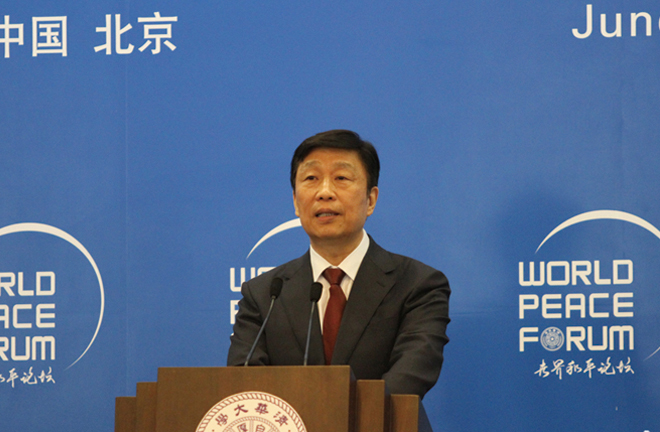Forum stresses shared peace, security

Chinese Vice-President Li Yuanchao delivered a speech at the fourth World Peace Forum on June 27 in Beijing.
The fourth World Peace Forum was recently held at Tsinghua University in Beijing. Attendees conducted in-depth discussions on such issues as reform of the international order, China-US relations and Asia-Pacific security cooperation.
The forum engaged former leaders of foreign countries, including former Australian Prime Minister Kevin Rudd, former French Prime Minister Dominique de Villepin and former Indonesian President Susilo Bambang Yudhoyono, alongside 45 ambassadors to China and nearly 100 international security experts from home and abroad. Chinese Vice-President Li Yuanchao addressed the opening ceremony.
Currently, profound and complicated changes are taking place in the international situation, which is marked by world multi-polarization, economic globalization and cultural diversification with the global pattern and world order evolving in a more rapid fashion. The future of the world order is therefore a common concern for the international community.
The frequently mentioned concept “community of common destiny” is a blueprint China has mapped out for the future international order. At the forum, Li further elaborated on what the peaceful, safe community of shared destiny for mankind should entail.
“Peace and security are preconditions of common development for mankind, therefore we should achieve friendship, respect and equality through understanding; achieve peace, harmony and reconciliation through consultation; and achieve common development, jointly overcome difficulties of the times and cooperate for win-win results through reciprocity, thus building a community of shared peace, security and fate for mankind together,” Li said.
Security cooperation in the Asia-Pacific region was another hot topic at the forum. Despite the existence of a number of organizations, institutions and forums in the region, there has so far been no security architecture that can cover the region.
“Concepts of common security take a long time to evolve. They cannot be created overnight. They require the evolution of functional institutions over time. They require the evolution of institutional culture, and this includes evolution of habits of cooperative problem-solving rather than immediately devolving to confrontation or even conflict or war,” Rudd noted as he proposed how to build a community of common destiny. The East Asia Summit (EAS) can be transformed into a more comprehensive pan-regional institution, he added.
Chinese Foreign Minister Wang Yi said China is committed to the path of peaceful development, which is of “immediate relevance for the Asia-Pacific.”
“We do not seek dominance or sphere of influence in the region, nor do we intend to form military alliances or drive any country out of the Asia-Pacific region. Instead, we are committed to solidarity and cooperation with other countries in pursuit of a new path of security for the region, which is built by all, shared by all, delivers mutually beneficial results for all and safeguarded by all,” he added.
Many participating experts held that the “One Belt, One Road” initiative, or Silk Road Economic Belt and 21st Century Maritime Silk Road, can drive economic development of related countries while also laying a new foundation for international security.
De Villepin said the “One Belt, One Road” initiative is ambitious with a grand vision. It aims to maintain world peace and stability through growth and development, while also investing in infrastructure construction in the region to provide an opportunity for the destitute population to avoid extremism, he added.
Yudhoyono expressed his confidence in the future of the Asia-Pacific region, believing it can become a more peaceful, stable and prosperous region. “The 21st-century Asia-Pacific region is big enough to hold traditional and emerging powers. We must firmly believe we can create peace for our time and later generations,” he said.
Mao Li is a reporter at the Chinese Social Sciences Today.

 PRINT
PRINT CLOSE
CLOSE